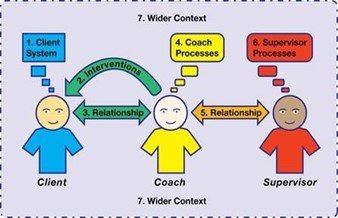 This article is written by Ranjit Manghnani, one of Forum Strategy’s executive coaches and a highly experienced, qualified executive coach supervisor. Ranjit explores the vital role of executive coaching in helping trust leaders to maximise their impact and in supporting continuous strategic leadership development. He reflects on how important it is for executive coaches to continually hone skills and competency through supervision sessions and explores the benefits this brings to trust leaders as coaching clients, including why this should be a ‘look for’ when commissioning coaching. With many offers out there for coaching support, as trust leaders, you need to be able to distinguish acceptable from exceptional if you are to derive real value from this investment in your development and good quality assurance is a key part of that.
This article is written by Ranjit Manghnani, one of Forum Strategy’s executive coaches and a highly experienced, qualified executive coach supervisor. Ranjit explores the vital role of executive coaching in helping trust leaders to maximise their impact and in supporting continuous strategic leadership development. He reflects on how important it is for executive coaches to continually hone skills and competency through supervision sessions and explores the benefits this brings to trust leaders as coaching clients, including why this should be a ‘look for’ when commissioning coaching. With many offers out there for coaching support, as trust leaders, you need to be able to distinguish acceptable from exceptional if you are to derive real value from this investment in your development and good quality assurance is a key part of that.
Executive coaching is fast becoming a core part of trust leaders’ working worlds and rightly so. The power of executive coaching to support reflection, constructive challenge and critical thinking has long been recognised, with the emphasis on individuals finding their own solutions and ways forward. Over the last few years in particular, executive coaching has also become a hallmark of many top quality development programmes. But, as with most things, as popularity increases so too do the offers of ‘quality’ coaching expertise. So as trust leaders investing in development, how can you be assured that what you access offers real value? The answer to this can partly be found in looking at how rigorous the organisation or company you commission from is, in quality assuring the expertise and skills on offer to you. Below we explore this in further detail.
Background to coaching supervision
The development of coaching services in the UK has, in many ways, been a haphazard process. Pretty much anyone can become a coach, and the process of professionalising coaching services has only recently been seriously introduced. The European Mentoring Coaching Council (EMCC) have repeatedly tried to get coaching accreditation providers to agree to shared coaching professional standards, however, many organisations have been reluctant for their members to sign up to these through fear of losing paying members to other coaching organisations. There are also hierarchical tensions concerning which organisation is viewed as “the best”, since the organisation that can command the largest membership will realistically be viewed as being in the best position to dictate the agenda for professionalising the entire coaching industry.
“as popularity increases so too do the offers of ‘quality’ coaching expertise. So as trust leaders investing in development, how can you be assured that what you access offers real value?”
Despite these issues, and after a difficult process of negotiations, ten coaching accreditation providers have now signed up to a Global Code of Ethics to promote excellent practice and ethical principles in coaching, mentoring and supervision. The Code sets out the expectation of best practice and also highlights the legal and statutory obligations for an individual coach and the coaching provider organisations. In my view this is an excellent development and I commend this initiative in the coaching industry.
In order to continue with professionalising the coaching Industry the EMCC recommends that members engage in supervision with a suitably qualified/experienced supervisor and peer supervision regularly, with 1 hour of supervision per 35 hours of practice. This ensures a minimum of 4 hours of coaching supervision per year, which is evenly distributed. The EMCC also stipulates that any other existing relationship within the supervision, professional or personal, must not interfere with the quality of the supervision provided. Additionally, EMCC coaches are encouraged to discuss any ethical dilemmas and potential, or actual, breaches of the Code with their supervisor.
Despite these steps forward, coaching supervision is not yet widely expected or demanded by coaches. In a study undertaken in Australia in which 179 experienced coaches were asked about their view on supervision, the key findings were that the majority supported coaching supervision, but nearly a third did not actually have any kind of supervision in practice, be it formal, informal or peer supervision. A similar situation was also highlighted during the EMCC conference in Zurich in 2005, where a straw poll indicated that though 80% of the members thought supervision was important for all coaches and supervisees, but they still did not engage in this process. My own recent poll with six coaches, though a very small and therefore not a significant sample indicated, likewise, that while they all supported the coaching supervision process for their development in principle, they were not interested in undertaking it in practice.
“Despite steps forward, coaching supervision is not yet widely expected or demanded by coaches.”
In my view there are a few key issues leading to this disconnect between what is set by the EMCC and what happens in practice. Firstly, many coaches inherently believe they do not need supervision because they have ample coaching experience, and therefore believe supervision will either not be helpful to them, or is simply unnecessary. Secondly, those who subscribe to the supervision process may struggle to find an appropriate supervisor who can support them effectively (there is currently a shortage of good practising accredited coaching supervisors in the coaching industry). Finally, as many coaches are self-employed they tend to incur expenses on their supervision sessions, and may prefer to avoid this additional cost. In my opinion, within these issues lies the dilemma of professionalising coaches and what happens in reality.
Having said all this there are, of course, many organisations providing first class coaching, and who believe in having a professional coaching pool where the coaches are expected, for the development of their coaching skills and competency, to follow the good practice as identified by the Global Code of Ethics. These organisations have coaching supervision at the heart of their coaches’ CPD. One such organisation is Forum Strategy, which has a highly professionalised executive coaching pool and maintains a supervision programme which is mandatory and dedicated to its coaches ongoing developmental journey. Forum Strategy believes in providing outstanding coaching services to help trust leaders further develop and to focus on their strategic thinking.
So why is coaching supervision so important to quality assurance?
Before we explore how supervision fits with quality assurance, it’s important to have a shared understanding of what coaching supervision actually is. The functions of coaching supervision include:
- Developing the competence and capability of the coach
- Providing a supportive space for the coach to process the experiences they have had when working with clients
- Encouraging professional practice related to quality, standards and ethics
All definitions of coaching supervision point to the need for it to be a ‘formal process’ within an organisational context, and I particularly like the following definition of coaching as:
“a formal process of professional support which ensures continuing development of the coach and effectiveness of his/her coaching practice through interactive reflection, interpretative evaluation and the sharing of expertise” (Bachkirova, Jackson and Clutterbuck 2011).
The formal process aims to professionalise the coaching supervision relationship (between supervisor and coach). This formalisation is important as it helps in supporting continued coaching accreditation and developing the ‘coaching process’ which otherwise might be delivered on an ad hoc basis. The critical aspect here is that it is a formal process contracted between a supervisor and the coach for facilitating in-depth reflection for coaches to discuss their work with someone who is experienced as a coach. It offers a confidential framework (within a collaborative working relationship) in which the practice, tasks, process and challenges of the coaching work can be explored and reflected upon.
“formalisation is important as it helps in supporting continued coaching accreditation and developing the ‘coaching process’ which otherwise might be delivered on an ad hoc basis.”
I have noticed that many supervision sessions are in general a chat. In my own experience as a coach going through a supervision session, it felt like the process was more about me being coached. The process provided me with interactive reflection and was a sharing of expertise, as opposed to purely focusing (in the strictest of confidence) on my relationship with my coaching clients. In my view the focus of supervision must be centred on mode 1 to mode 4 as opposed to mode 4 to mode 7 of the model of ‘the seven eyed model’ shown below. This is the differentiator for the supervision session.

What are the main risks and benefits of supervision?
The benefit of defining a coaching supervision process allows for clarity, purpose and an aim. It also helps in the design of standards and thus the competency and skills required by a supervisor to undertake the supervision process. As alluded to earlier, without the formal process the supervision sessions may be delivered on the personal agendas of an individual. And invariably when things go wrong (for example, during an employment tribunal) it would be difficult to justify the integrity of the coaching supervision, particularly for an organisation providing a coaching pool service, as they too would be vicariously liable.
So how does this relate to trusts and trust leaders accessing (or planning to access) executive coaching in future?
The purpose of coaching supervision should be based on the principle of helping coaches to improve and develop themselves for the benefit of the clients and the organisations they represent (in this case, trusts and their leaders). Some organisations have mandatory supervision for their coaches, whilst other organisations – which focus on coaching supervision as an ‘interpersonal’ developmental process – may have a wider policy which would focus on learning and development, and make supervision more voluntary in nature. However, the risk with such, is that the organisation may have a loose policy for the supervision process where both the coach and supervisor are not clear on the expectation and needs in the organisational context. In my view it is essential if supervision is undertaken in the organisation’s context, particularly using an external supervisor, that a clarity on the policy and requirement is essential, for example, using the Global Code of Ethics and Values.
“At Forum Strategy coaching supervision is at the heart of developing executive coaches, and the benefits of this have been acknowledged by the individuals’ who have participated in the supervision sessions.”
The benefits of coaching supervision is that it provides support for the commissioning organisation by helping and developing their employee or associate, managing talent and motivating to enhance performance. Coaching supervision can help in supporting the organisation’s internal coach or line managers, who adopt the role of a coach by seeking accountability and fairness in the interaction, and providing a service based on the organisational vision and its values.
The risk is that if clear policies and procedures are not sighted then the process of coaching supervision can easily drift to an informal process and therefore not properly benefit the client or meet the organisation’s aims and objectives. In my judgement coaching supervision requires a clear policy and procedure along with clarity of the sponsor / organiser’s accountability in agreeing to the supervision process that’s being undertaken.
At Forum Strategy coaching supervision is at the heart of developing executive coaches, and the benefits of this have been acknowledged by the individuals’ who have participated in the supervision sessions. All Forum Strategy executive coaches are invited to participate in group coaching supervision sessions (4 hrs) every 6 months, thus maintaining professionalism, reflection and engagement on effective coaching processes for their clients. This process complies with the EMCC’s recommendation and meets the Global Code of Ethics and Values in coaching best practice.


